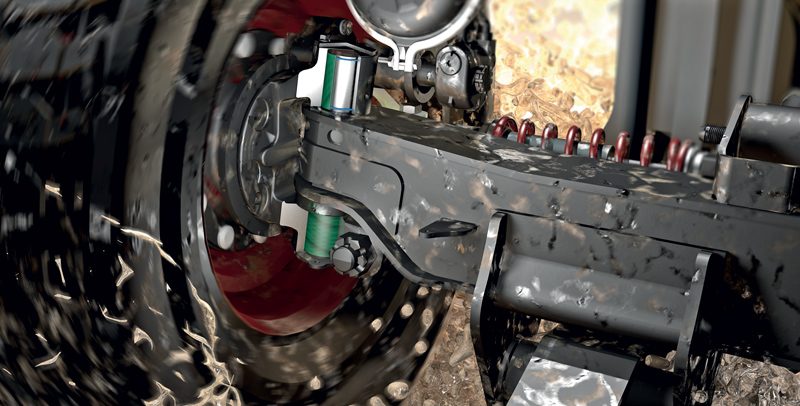Self-lubricating Bearings for Off-Highway Vehicles
Federal-Mogul Powertrain has validated its self-lubricating and maintenance-free deva.tex sliding bearings, for applications on earthmoving, agricultural and special-purpose vehicles, with intensive tests to optimize their friction and wear properties.
by Giorgia Stella
The validation process of Federal-Mogul Powertrain of its maintenance-free DEVA® bearings has been successfully completed.
Following in-house tribological testing and customer-specific field investigations, deva.tex® composite bearings are being commercialized for use in construction machines, agricultural vehicles and other special-purpose vehicles, such as road sweepers. The fibre-reinforced bearings are able to reduce the environmental impact, downtime and maintenance costs associated with traditional grease-lubricated bearings.
Federal-Mogul Powertrain has carried extensive rig trials to optimise friction and wear properties under specific operating conditions as part of the validation process. The deva.tex two-layer fibre reinforced composite bearings have been run against various shaft materials as well as under varying load, sliding speed and oscillating cycle conditions.
Materials that conform better to the shaft geometry
A significant advantage of DEVA composite materials is the ability to reduce wear and eliminate the premature failures that can occur in metal bearings when subjected to shaft misalignment. This is made possible by the materials’ heightened tolerance of shaft offset or misalignment: unlike metal bushes, the softer DEVA materials conform better to the shaft geometry, spreading the contact over a larger area and increasing the load capacity.
“Different special-purpose vehicles operate in such distinct and often challenging environments, and so it is unrealistic for a single off-the-shelf design to satisfy all applications,” explained Stefan Henß, Senior Engineering Manager DEVA, Federal-Mogul Powertrain. “Any successful implementation requires collaboration with the customer to ensure the bearing forms part of an integrated tribological system”.
Extensive validation process
Tests highlighted the importance of specifying the appropriate surface properties for the shaft, to maintain a stable and robust tribological system. The hardness needs to be above 220 HB Brinell when used with deva.tex, and surface roughness between 0.4 and 1.0 μm Ra. Suitable corrosion resistance is also required, for example by using stainless steel or an appropriate coating. This enables the bearing to transfer a stable film onto the shaft surface, maintaining a constant coefficient of friction and the lowest possible wear rate. Having validated bearing performance, the future research priority for Federal-Mogul Powertrain will be to investigate the potential of economical shaft coatings. These will be evaluated for corrosion resistance, wear performance and sliding properties to establish the optimum for use with DEVA bearings.

